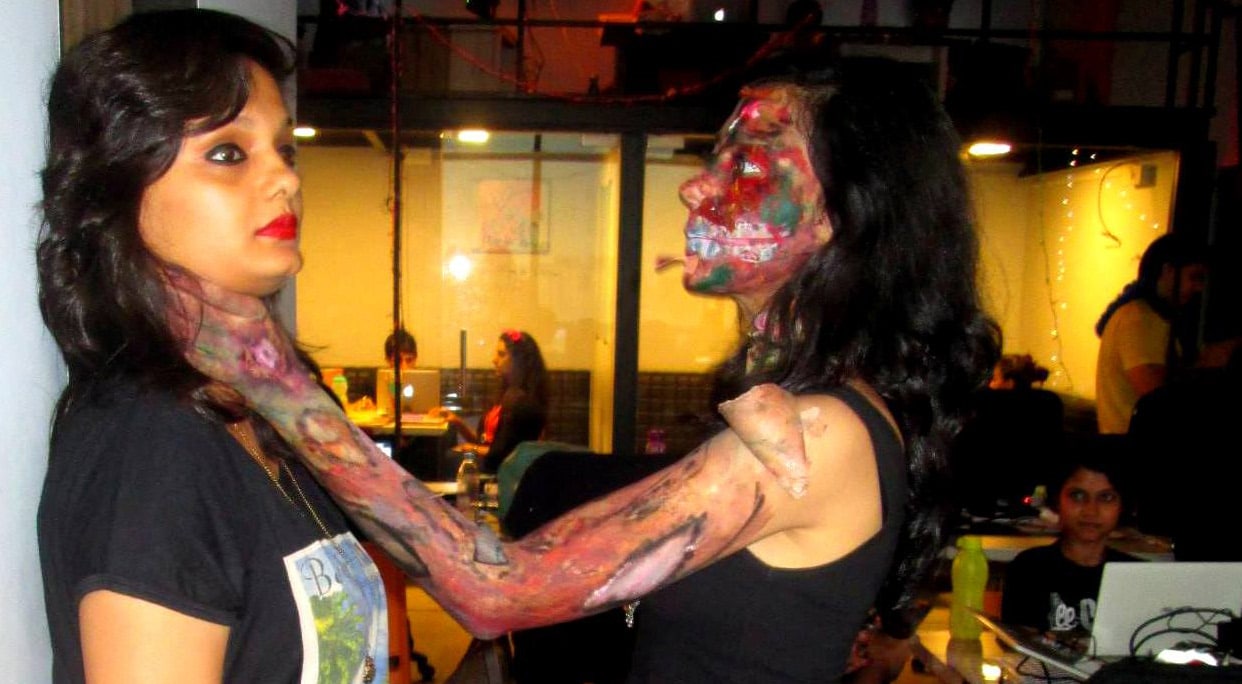Life
Let the Trick-or-Treating Begin: Halloween Gains Foothold in India

Aakanksha Bhattacharya (right) and Ishita Shelat at a Halloween party in Mumbai.
Photo: Rayyan Rashid
A source of nostalgia for returned NRIs and expats, and fun for the metropolitan crowd, Halloween is becoming India's own festival.
Many an op-ed and satires have been written about the rise of Halloween in India. Most of them express curiosity, some absolute bemusement and some horror at a trend they are attributing to a generation growing up on American sitcoms like Friends and How I Met Your Mother, all of which have Halloween special episodes.
However, for most NRIs who have returned to the country, it is a source of nostalgia for a festival they used to celebrate with aplomb during their stay abroad. Preetha J Sebastian, a graduate student in Bengaluru who now studies in Dartmouth, grew up in a thriving community in Dubai where trick-or-treating became an essential part of her childhood. “I wore the same witch costume every year,” she told Little India.
The apartment complex Sebastian lived in while working in Bengaluru, to her delight, celebrated the festival. “When Halloween came around, it became harder to be an adult. I had to be the one buying candy to give away to the neighborhood kids, which was a harsh reality to face. Some of the children didn’t even dress up! But, eventually, I found joy in giving away candy. I was too big to fit into my child-size witch costume anyway.”
Sebastian’s condominium complex was not the only one honoring the spirit of the dead. Shruti Narayanan, a dancer based in Bengaluru, says her community, which is a home to a lot of expats and returned NRIs like herself, celebrates Halloween every year. “There is constant merriment because you can hear the kids and teenagers running around and saying trick or treat,” she says. But the children only ask only at houses that have print-outs stuck outside saying, “Sweetmeats available,” since many Indian families in the neighborhood don’t get the concept and don’t celebrate the occasion.
Agrees Suman Kumar, a stand-up comedian who is looking to buy a zombie costume for his daughter this year, “Some families just don’t know the idea behind the festival,” he says, recounting how his neighbor just looked at kids blankly when they asked him for a trick or treat. “What he understood was that they wanted chocolates, which he gave them,” Kumar says.

Preetha J Sebastian as Death from Neil Gaiman’s Sandman.
Lakshmi Selvakumaran, who did her Ph.D. in Saudi Arabia, recalls her experience of confused India families who did not have a stock of candies ready. “They end up giving the children leftover Diwali sweets or gulab jamuns just because someone has come to their house,” she says.
Narayanan attributes the confusion to just the lack of knowledge among Indians about the Halloween tradition of trick-or-treating, which involves a threat made by the child, about whether the hosts would like mischief or to give them a treat. “Some houses here don’t even want to bother opening the door,” she reveals. “So what they do instead is fill a pot with chocolates or toffee and leave it outside for kids to come and take.”
Even though themed parties are mushrooming in hotels and clubs in metropolitan cities in India, people generally don’t have much knowledge on why Halloween – All Hallows Eve — is celebrated, if at all. “Not many of them know that Halloween came from the earlier cultures of worshiping the dead,” says Ankur Huralikoppi, an engineer based in California, where he sees celebrations every year. “It was thought that spirits are fond of kids, and on that day pleasing kids meant keeping the spirits happy.”
So while the occasion, which is observed the day before All Saints Day on Nov. 1 and All Souls Day on Nov. 2, is a time to honor recently-departed souls who are yet to reach heaven, it has been overshadowed by the bonhomie associated with costumes and make-up. Says Sean Pereira, a business professional, “While the costume parties have caught on, Christians just go to mass and visit the graves of their loved ones.”
And costume parties have caught on indeed. Every year, there is a new restaurant or bar holding a Halloween-theme night. Cafe Out of the Box in New Delhi has been hosting Halloween parties since 2010. Every year, they make signature cocktails, and name them according to the theme. For example, Dracula’s Blood is a Bloody Mary with a twist. “We usually play around with our interiors, try to make it look spooky,” Priyank Sukhija, the cafe’s owner, told IANS in an earlier interview. “The turnout has always been huge with a mix crowd, including expats.”
Not to be left behind, The Junction in Haus Khas Village in the Indian capital, is hosting a warehouse party this year with a mental asylum-themed decor with prizes for the “spookiest” dressed person. In Mumbai, Halloween is an opportunity for people to party, with many hotels hosting DJ nights, from the Taj to the Marriott.

Bengaluru, on the other hand, which has a thriving community of expats and returned NRIs, sees Halloween parties at every nook and corner of the city. Advertising professional Aakanksha Bhattacharya was a regular at such parties while she lived in Mumbai, and is looking forward to having more fun now that she is moved to Bengaluru.
While Arbor Brewing Company in the city has been hosting a party every year with themed menu and drinks, the newer pub Koramangala Social will organize its first themed party for Halloween this year. Harry Potter, more often than not, is a staple costume for a lot of people, says Samrudhi Sridharan, a researcher for an NGO based in the city. “I dress up as Hermione Granger every year. It is the easiest costume to put together and it is a character I relate to.”
It doesn’t seem to matter that Halloween is a festival that has no roots in India: it is another opportunity to get together, to dress up, albeit in spooky costumes or even more interesting, as characters, and for children to enjoy sweets. It sounds like an alternate version of our own Indian festivals, doesn’t it?




You must be logged in to post a comment Login